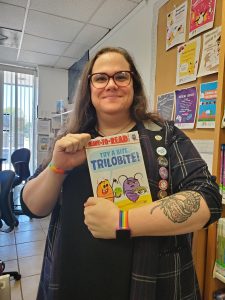May
20

Posted by liaison on May 20th, 2024
Posted in: #CC/Academic List, Opportunity to Participate
NNLM Region 4 is highlighting Katherine Smith, Library Branch Manager of Manvel Public Library, for her accomplishment of receiving her Consumer Health Information Specialization (CHIS) certification. Below, Katherine shares a bit about herself and her experience in obtaining her CHIS certification through the Consumer Health for Library Students Program.
accomplishment of receiving her Consumer Health Information Specialization (CHIS) certification. Below, Katherine shares a bit about herself and her experience in obtaining her CHIS certification through the Consumer Health for Library Students Program.
Can you give us an elevator speech about your library career?
My library career is rather short. I have my master’s degree in history, and I originally started as a history professor at a local college, where I taught for seven years. With the COVID pandemic and kind of losing the spark in the field, I decided to go a different route and move toward my passion. I got a job at the local library, and I came in as a clerk, and I loved it. It was great! Immediately, I knew that public libraries were for me, and I wanted to go ahead and get my MLS. Recently, I became the manager of the same library that I started with as a clerk. Within a couple of years, I went from one career to another new degree, and now I’m a library manager.
How did you hear about the CHIS certification?
While I was a clerk, I heard about the CHIS certification through NNLM. I wanted to get my CHIS because I work in a small community library. If someone wanted to find information related to their ailment or information provided by their doctor, I wanted to have something that says I’m someone they can come to ask questions and I can point them in the right direction. I went ahead and got my CHIS Level 1 certification.
While I was in my graduate program at Texas Women’s University, I took a course that awarded me the chance to get my CHIS level 2 as a part of the course. It was excellent that this would work out where I was getting the next level of my certification while attending my program.
Describe your experience taking a CHIS-certified course through your LIS/iSchool program.
It was my final semester when I took the Patient and Consumer Health Information course taught by Dr. Carol Perryman. It was a really fun course. I did not know what to expect going into it, but it really did make me kind of ponder going into medical librarianship because she took the course and embedded it with a lot of her personal experience. Taking this course was so impactful. Learning the little aspects that Dr. Perryman infused with her own career and her own experiences. It really showed the importance of the field altogether.
How has your CHIS certification helped you in your current role?
The certification gave me that extra boost—not just to put on my resume but also to make me feel good knowing that I can go out and show that I can help public libraries provide consumer health resources to patrons. I think it holds a very particular niche, and I’ve actually pushed others to get their CHIS certification as well.
The CHIS training helped bridge the gap between medical databases and my prior training in research and other databases. It helped bridge the gap not only for the medical and consumer health parts but also for the librarian’s role in providing consumer health resources. I had an instance where a patron came in who had just come from the doctor and had notes from her doctor’s visit. She needed help looking things up from her notes. If I hadn’t gone through the CHIS training before, I would have just looked up the information for her. Instead, I was able to point her in the right direction and help her figure out where to find the information she needed. That way, she knows where to go if she needs to find this information again.
Do you have any advice for LIS/iSchool students looking to earn their CHIS certification?
Get it! There’s no reason not to. No matter what field of library you’re going into or whether you stay in the field of librarianship or not, it is still useful. If someone in your family comes up sick or needs help finding information, you’ve already got some background on how to help. It’s better to have it, not need it, than need it and not have it. That’s why I went for it.
If you want to learn more about the Consumer Health for Library Students Program, visit nnlm.gov or contact Sam Nunn at sam.nunn@utah.edu.